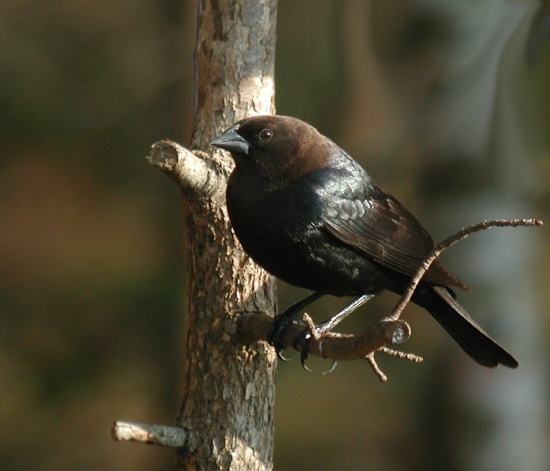(→Voice) |
|||
| Line 2: | Line 2: | ||
[[Image:Brown-headed_Cowbird.jpg|thumb|550px|right|Photo by KC Foggin]] | [[Image:Brown-headed_Cowbird.jpg|thumb|550px|right|Photo by KC Foggin]] | ||
==Identification== | ==Identification== | ||
| − | + | 15-20cm. '''Male''' - black plumage, glossy brown head. '''Female''' - grey brown. | |
| − | |||
| − | |||
| − | |||
| − | |||
| − | |||
| − | |||
==Distribution== | ==Distribution== | ||
| − | + | [[British Columbia]], central [[Saskatchewan]], central [[Ontario]], [[Quebec]], [[Newfoundland]] southward throughout [[United States]]. | |
| + | |||
==Taxonomy== | ==Taxonomy== | ||
Polytypic. Consists of four subspecies. | Polytypic. Consists of four subspecies. | ||
==Habitat== | ==Habitat== | ||
| − | + | Farmland, foreste edges, suburbs. | |
| − | |||
| − | |||
| − | |||
| − | Cowbirds are brood parasites | + | ==Behaviour== |
| + | Cowbirds are brood parasites; the female removes one egg from the host nest and lays one of her own. 4-5 white, brown speckled eggs are laid, one at a time. | ||
====Vocalisation==== | ====Vocalisation==== | ||
| − | + | Song: A liquid, bubbly gurgle followed by an upslurred, high-pitched whistle (given during display). | |
| − | A liquid, bubbly gurgle followed by an upslurred, high-pitched whistle (given during display). | + | |
| − | + | Call: ''check'' or a rattle. | |
| − | ''check'' or a rattle. | + | |
| + | ==References== | ||
| + | eNature | ||
| − | |||
| − | |||
==External Links== | ==External Links== | ||
{{GSearch|Molothrus+ater}} | {{GSearch|Molothrus+ater}} | ||
[[Category:Birds]][[Category:Molothrus]] | [[Category:Birds]][[Category:Molothrus]] | ||
Revision as of 15:49, 7 January 2009
- Molothrus ater
Identification
15-20cm. Male - black plumage, glossy brown head. Female - grey brown.
Distribution
British Columbia, central Saskatchewan, central Ontario, Quebec, Newfoundland southward throughout United States.
Taxonomy
Polytypic. Consists of four subspecies.
Habitat
Farmland, foreste edges, suburbs.
Behaviour
Cowbirds are brood parasites; the female removes one egg from the host nest and lays one of her own. 4-5 white, brown speckled eggs are laid, one at a time.
Vocalisation
Song: A liquid, bubbly gurgle followed by an upslurred, high-pitched whistle (given during display).
Call: check or a rattle.
References
eNature




